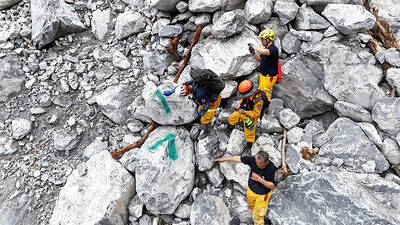Public health specialists at National Taiwan University (NTU) yesterday urged the Centers for Disease Control (CDC) to designate COVID-19 a category 1 notifiable communicable disease.
They also advised against allowing a large proportion of the population to become infected to achieve “herd immunity.”
NTU College of Public Health vice dean Tony Chen (陳秀熙) said that the WHO on Wednesday last week declared the COVID-19 outbreak a pandemic and the virus is spreading from international transportation hubs to other countries and regions on all continents, including India, Africa and Australia.

Photo: CNA
Many people are concerned about how the virus spread from the US’ west coast to its east coast and to almost all its states, he said, adding that countries in the Middle East with reported cases jumped from 10 to 17 last week, and cases are also being reported in countries with poor health systems.
“Different countries have chosen different approaches against the COVID-19 outbreak, such as Israel, Australia and New Zealand adopting strict border control and travel restrictions,” he said, adding that other measures including a lockdown, exit-entry controls, suspending school or banning public gatherings are also being implemented in other countries.
However, he said that a few European countries have taken a more passive approach, including not conducting COVID-19 testing unless a patient is in a critical condition, or letting more than half the population become infected by the coronavirus to grow immunity to it and achieve “herd immunity,” which is “definitely inadvisable.”
Although some infected patients can recover on their own, they can transmit the virus to people with higher risk of serious complications, he said, adding that people in countries with better health systems could carry the virus to countries with poorer health systems, hugely affecting those people and areas.
Each nation’s disease prevention and control policies should be made keeping the global disease prevention ecosphere in mind, Chen said, adding that while the risk of COVID-19 infection in Taiwan has been relatively low, the nation should remain alert and not relax its control measures.
NTU public health specialists have called on the UN to designate COVID-19 as an international quarantinable communicable disease and the government to list it as a category 1 notifiable communicable disease, so that they would have legal authority to implement stricter disease control measures, he said.
When asked to comment on the policy of building herd immunity, Minister of Health and Welfare Chen Shih-chung (陳時中), who heads the Central Epidemic Command Center (CECC), said on Saturday that “Taiwan would not implement this approach.”
“Every country will choose its disease prevention strategy according to its epidemic situation and medical resources, and generally the ‘herd immunity’ approach is taken when the nation’s healthcare system is overwhelmed by a large number of infected patients in a short period of time,” he said. “Taiwan is not facing such a situation.”
Chen Shih-chung said that herd immunity approach would be feasible if there was a 100 percent guarantee that COVID-19 would not cause serious complications.
Currently there is no scientific evidence to prove how long it takes for an infected person to gain immunity after infection, he said.
NTU Institute of Food Safety and Health director Chen Chia-yang (陳家揚) yesterday said that the food service industry should enhance hygiene regulations and employees’ health management, as well as reorganize restaurant environment for more effective disease prevention.
Restaurants should require employees to thoroughly wash their hands with soap frequently at work, to wear sterile gloves when preparing food, to separate the jobs of cashier and food courier, and to stay at home when they are feeling ill, he said.
Restaurants should stop providing free food samples at food courts, college dean Chan Chang-chuan (詹長權) said, adding that it is suggested that they refer to the half-capacity mandate in New York, which requires customer capacity to be reduced so that there is more space between people, or insert a board between strangers eating at the same table.

Former president Ma Ying-jeou’s (馬英九) mention of Taiwan’s official name during a meeting with Chinese President Xi Jinping (習近平) on Wednesday was likely a deliberate political play, academics said. “As I see it, it was intentional,” National Chengchi University Graduate Institute of East Asian Studies professor Wang Hsin-hsien (王信賢) said of Ma’s initial use of the “Republic of China” (ROC) to refer to the wider concept of “the Chinese nation.” Ma quickly corrected himself, and his office later described his use of the two similar-sounding yet politically distinct terms as “purely a gaffe.” Given Ma was reading from a script, the supposed slipup

Former Czech Republic-based Taiwanese researcher Cheng Yu-chin (鄭宇欽) has been sentenced to seven years in prison on espionage-related charges, China’s Ministry of State Security announced yesterday. China said Cheng was a spy for Taiwan who “masqueraded as a professor” and that he was previously an assistant to former Cabinet secretary-general Cho Jung-tai (卓榮泰). President-elect William Lai (賴清德) on Wednesday last week announced Cho would be his premier when Lai is inaugurated next month. Today is China’s “National Security Education Day.” The Chinese ministry yesterday released a video online showing arrests over the past 10 years of people alleged to be

THE HAWAII FACTOR: While a 1965 opinion said an attack on Hawaii would not trigger Article 5, the text of the treaty suggests the state is covered, the report says NATO could be drawn into a conflict in the Taiwan Strait if Chinese forces attacked the US mainland or Hawaii, a NATO Defense College report published on Monday says. The report, written by James Lee, an assistant research fellow at Academia Sinica’s Institute of European and American Studies, states that under certain conditions a Taiwan contingency could trigger Article 5 of NATO, under which an attack against any member of the alliance is considered an attack against all members, necessitating a response. Article 6 of the North Atlantic Treaty specifies that an armed attack in the territory of any member in Europe,

The bodies of two individuals were recovered and three additional bodies were discovered on the Shakadang Trail (砂卡礑) in Taroko National Park, eight days after the devastating earthquake in Hualien County, search-and-rescue personnel said. The rescuers reported that they retrieved the bodies of a man and a girl, suspected to be the father and daughter from the Yu (游) family, 500m from the entrance of the trail on Wednesday. The rescue team added that despite the discovery of the two bodies on Friday last week, they had been unable to retrieve them until Wednesday due to the heavy equipment needed to lift